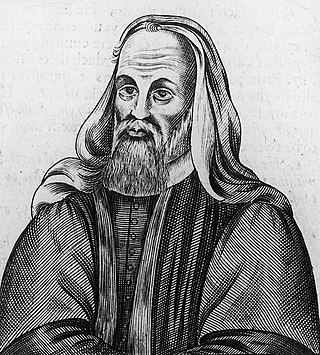Related Research Articles
Ambrosiaster or Pseudo-Ambrose is the name given to the unknown author of a commentary on the epistles of Saint Paul, written some time between 366 and 384 AD. The name "Ambrosiaster" in Latin means "would-be Ambrose". Various conjectures have been made as to Ambrosiaster's true identity, and several other works have been attributed to the same author, with varying degrees of certainty.

The Epistle of James is a general epistle and one of the 21 epistles in the New Testament. It was written originally in Koine Greek.

The Epistle to the Hebrews is one of the books of the New Testament.

The Epistle to the Galatians is the ninth book of the New Testament. It is a letter from Paul the Apostle to a number of Early Christian communities in Galatia. Scholars have suggested that this is either the Roman province of Galatia in southern Anatolia, or a large region defined by Galatians, an ethnic group of Celtic people in central Anatolia. The letter was originally written in Koine Greek and later translated into other languages.

The Epistle to Titus is one of the three pastoral epistles in the New Testament, historically attributed to Paul the Apostle. It is addressed to Saint Titus and describes the requirements and duties of presbyters/bishops.

The Epistle to the Romans is the sixth book in the New Testament, and the longest of the thirteen Pauline epistles. Biblical scholars agree that it was composed by Paul the Apostle to explain that salvation is offered through the gospel of Jesus Christ.

Origen of Alexandria, also known as Origen Adamantius, was an early Christian scholar, ascetic, and theologian who was born and spent the first half of his career in Alexandria. He was a prolific writer who wrote roughly 2,000 treatises in multiple branches of theology, including textual criticism, biblical exegesis and hermeneutics, homiletics, and spirituality. He was one of the most influential and controversial figures in early Christian theology, apologetics, and asceticism. He has been described as "the greatest genius the early church ever produced".

Paul, commonly known as Paul the Apostle and Saint Paul, was a Christian apostle who spread the teachings of Jesus in the first-century world. For his contributions towards the New Testament, he is generally regarded as one of the most important figures of the Apostolic Age, and he also founded several Christian communities in Asia Minor and Europe from the mid-40s to the mid-50s AD.
Pelagianism is a Christian theological position that holds that the fall did not taint human nature and that humans by divine grace have free will to achieve human perfection. Pelagius, an ascetic and philosopher from the British Isles, taught that God could not command believers to do the impossible, and therefore it must be possible to satisfy all divine commandments. He also taught that it was unjust to punish one person for the sins of another; therefore, infants are born blameless. Pelagius accepted no excuse for sinful behaviour and taught that all Christians, regardless of their station in life, should live unimpeachable, sinless lives.

Pelagius was an Irish theologian known for promoting a system of doctrines which emphasized human choice in salvation and denied original sin. Pelagius was accused of heresy at the synod of Jerusalem in 415 and his doctrines were harshly criticized by Augustine of Hippo, especially the Pelagian views about mankind's good nature and individual responsibility for choosing asceticism. Pelagius especially stressed the freedom of human will. Very little is known about the personal life and career of Pelagius.

The Pauline epistles, also known as Epistles of Paul or Letters of Paul, are the thirteen books of the New Testament attributed to Paul the Apostle, although the authorship of some is in dispute. Among these epistles are some of the earliest extant Christian documents. They provide an insight into the beliefs and controversies of early Christianity. As part of the canon of the New Testament, they are foundational texts for both Christian theology and ethics.

The pastoral epistles are a group of three books of the canonical New Testament: the First Epistle to Timothy, the Second Epistle to Timothy, and the Epistle to Titus. They are presented as letters from Paul the Apostle to Timothy and to Titus. However, many scholars believe they were written after Paul's death. They are generally discussed as a group and are given the title pastoral because they are addressed to individuals with pastoral oversight of churches and discuss issues of Christian living, doctrine and leadership. The term "pastorals" was popularized in 1703 by D. N. Berdot and in 1726 by Paul Anton. Alternate nomenclature for the cluster of three letters has been proposed: "Corpus Pastorale," meant to highlight the intentional forgery of the letters as a three-part corpus, and "Letters to Timothy and Titus," meant to emphasize the individuality of the letters.

Frederick Fyvie Bruce, usually cited as F. F.Bruce, was Rylands Professor of Biblical Criticism and Exegesis at the University of Manchester from 1959 until 1978 and one of the most influential evangelical scholars of the second half of the twentieth century. His importance comes from the fact that when the academic community looked down upon Evangelicals, Bruce demonstrated that a scholar holding evangelical views could do worthwhile academic work. At the same time, he persuaded Evangelicals that they should not turn their backs on academic methods of Bible study, even if the results might differ from traditional evangelical views. As a result, he has been called the "Dean of Evangelical Scholarship".

Joseph Augustine Fitzmyer was an American Catholic priest and scholar who taught at several American and British universities. He was a member of the Society of Jesus (Jesuits).

The ransom theory of atonement was a theory in Christian theology as to how the process of Atonement in Christianity had happened. It therefore accounted for the meaning and effect of the death of Jesus Christ. It was one of a number of historical theories, and was mostly popular between the 4th and 11th centuries, with little support in recent times. It originated in the early Church, particularly in the work of Origen. The theory teaches that the death of Christ was a ransom sacrifice, usually said to have been paid to Satan, in satisfaction for the bondage and debt on the souls of humanity as a result of inherited sin.

Leon Lamb Morris was an Australian New Testament scholar and theologian.

Romans 1 is the first chapter of the Epistle to the Romans in the New Testament of the Christian Bible. It is authored by Paul the Apostle, while he was in Corinth in the mid-50s AD, with the help of an amanuensis (secretary), Tertius, who adds his own greeting in Romans 16:22. Acts 20:3 records that Paul stayed in Greece, probably Corinth, for three months. The letter is addressed "to all in Rome who are loved by God and called to be saints".

Augustinianism is the philosophical and theological system of Augustine of Hippo and its subsequent development by other thinkers, notably Boethius, Anselm of Canterbury and Bonaventure. Among Augustine's most important works are The City of God, De doctrina Christiana, and Confessions.
Origen and the History of Justification: The Legacy of Origen's Commentary on Romans (2008) is a book by Thomas P. Scheck and published by University of Notre Dame Press. The book explores "the legacy of Origen’s [Commentary on Romans] in the West, focusing on its influence upon Pelagius, Augustine, William of St. Thierry, Erasmus of Rotterdam, Melanchthon, and post-Reformation controversies". Developed from Scheck's doctoral dissertation, the book received generally positive reviews.
The Ancient Christian Writers: The Works of the Fathers in Translation is a book series with English translations of works by early Christian writers. The translations are made from Latin and Greek. The series was founded by Johannes Quasten and Joseph C. Plumpe, the first volume being published in 1946.
References
- 1 2 Scheck 2012, p. 79.